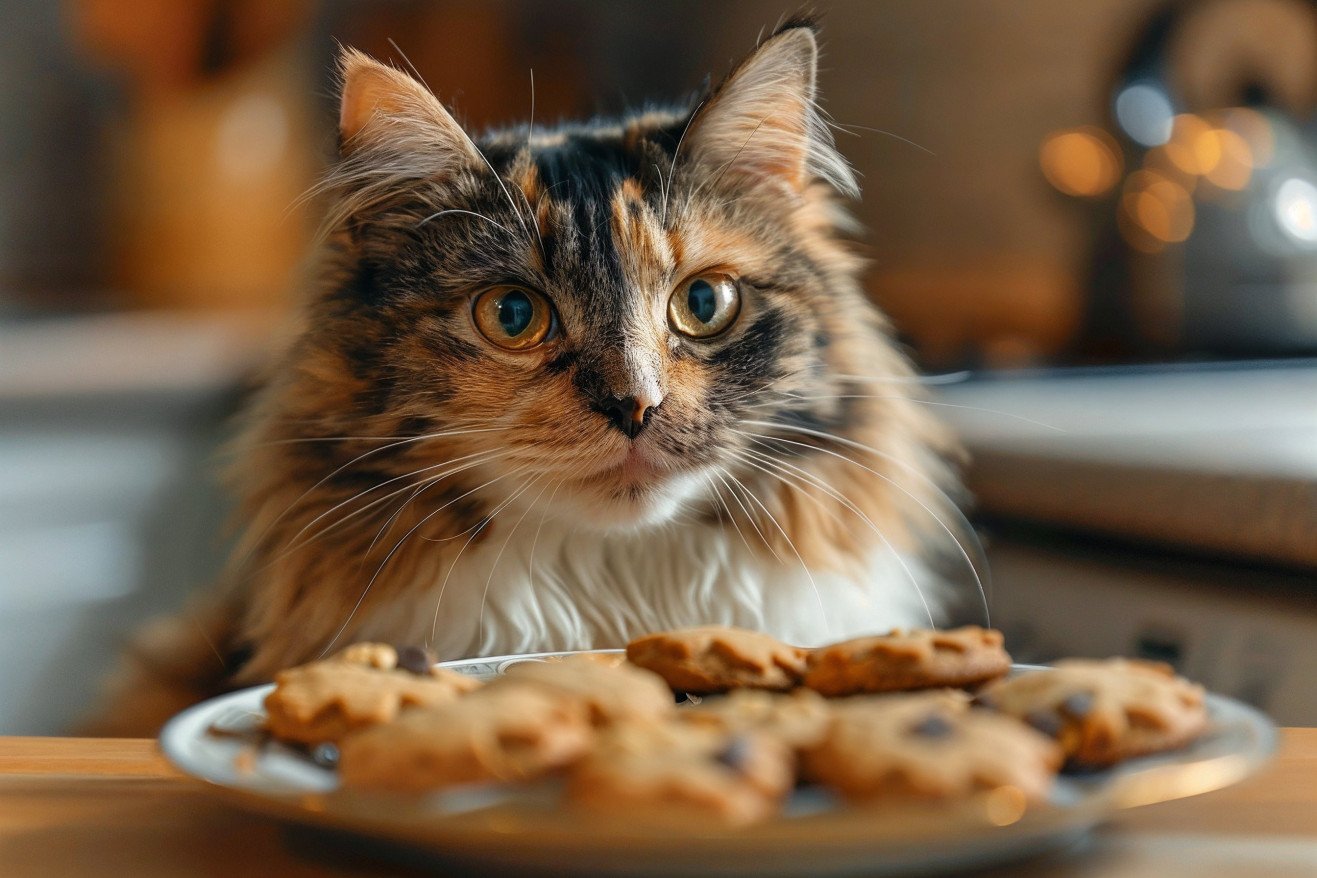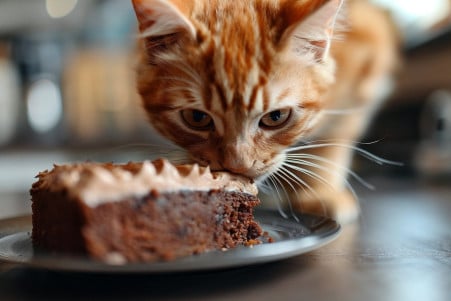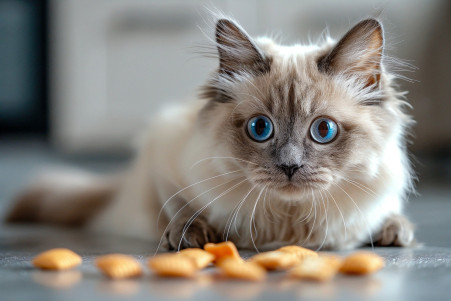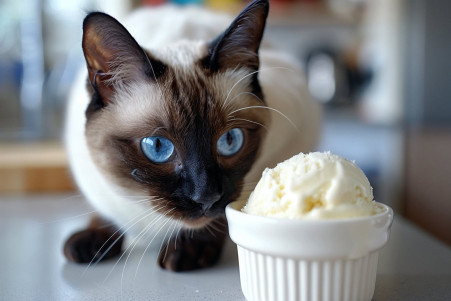Can Cats Have Cookies? What Cats Should Eat Instead
4 June 2024 • Updated 3 June 2024

While you may enjoy cookies as an occasional treat, can you share them with your cat? The answer is complicated. While most cats can eat a small amount of a plain cookie without any issues, cookies are not a good choice for your cat's diet. They often contain ingredients like sugar, butter, and chocolate that can be toxic or cause gastrointestinal upset in cats. Instead, you should stick to cat treats and your cat's regular balanced diet to ensure they get the nutrients they need.
To help you understand which foods are safe and unsafe for your cat, we'll take a deep dive into the dietary requirements and nutritional studies of these animals. Through this overview of expert advice and research, you'll learn why cookies and other human foods are off-limits if you want to ensure your cat's health.
Can cats eat cookies?
Toxic Ingredients in Cookies and Other Human Foods
There are several ingredients in cookies and other human foods that are toxic to cats, including chocolate, onions, garlic, grapes, raisins, caffeine, and alcohol. Chocolate, which contains theobromine and caffeine, is especially dangerous to cats even in small amounts and can result in vomiting, diarrhea, seizures, and other serious symptoms.
Onions, garlic, and chives from the Allium family can cause a cat's red blood cells to break down, which can lead to anemia and other problems. Grapes and raisins can lead to kidney failure in cats, while caffeine and alcohol can cause their nervous systems to become overstimulated and result in a number of issues.
Per the ASPCA, professionals strongly recommend against giving cats any human foods that contain these toxic ingredients because they can be very dangerous to their health. It's important to make sure that cats don't consume these ingredients to ensure their safety and well-being.
The Best Cat Treats and Snacks
Because of their unique dietary needs, cats are best served by high-quality, meat-based cat treats and food formulated by veterinary nutritionists. Purina notes that some safe and healthy treats for cats include small amounts of cooked meat, freeze-dried meat, commercial cat treats, cooked eggs, catnip, and valerian root.
To avoid obesity and other health problems, it's best to keep treats to no more than 10% of a cat's daily caloric intake. WebMD recommends choosing treats that are approved by the Association of American Feed Control Officials (AAFCO) and avoiding treats that contain wheat, artificial preservatives, and are high in calories. It can also be helpful to choose crunchy treats that are designed to help control plaque and dental disease in older cats, as long as they are made specifically for cats.
With a diet that includes high-quality, meat-based cat food and treats, cat owners can make sure their pets are getting the nutrition they need to be healthy and happy.
How to Tell If Your Cat Has Been Poisoned
If a cat eats a toxic human food like chocolate in a baked good, it’s important to know the signs of poisoning. The Pet Poison Helpline lists the following symptoms of chocolate poisoning in cats: vomiting, diarrhea, tremors, seizures, arrhythmia, weakness, tachypnea, and hyperthermia.
More serious symptoms include hypertonicity, hyperreflexia, cardiac arrest, and coma, all of which require immediate medical attention. Wedgewood Pharmacy adds that signs of poisoning in cats can also include hypersalivation, depression, and CNS depression, depending on the specific toxicant.
If you notice any of these symptoms or suspect your cat has ingested a toxic substance, the cat should be taken to a veterinarian immediately. The Pet Poison Helpline says that getting treatment quickly can make a big difference in the cat’s prognosis.
How to Keep Cats Away From Human Food
In order to protect cats from the dangers of human food, it is important to make sure that they never have access to it. The Spruce Pets explains that the biggest reason to avoid feeding cats "people food" is that there are many things that are toxic to cats. Even a small amount can be deadly.
To ensure that cats never eat human food, experts advise against ever giving it to them, even in the form of "licking the plate," and keeping all human food out of their reach, which can be done by putting it in a secure container or cabinet. Closer Pets even suggests using pet deterrents like citrus or cinnamon scents, sticky tape, or aluminum foil to keep cats away from countertops or other areas where human food is present.
If you have more than one cat, Closer Pets says that you can use microchip-enabled pet feeders that only open for a specific cat to make sure that one cat doesn't eat another's food. In addition, it can be helpful to always supervise feeding times and make sure that you stop a cat from eating another's food if you catch them in the act to make sure that they never get a taste for human food.
Taking these steps can help cat owners make sure that they are keeping their pets safe from the dangers of human food.
Conclusion: Keeping Cats Healthy and Safe
Although the occasional bite of a plain cookie is unlikely to hurt most cats, it's best to avoid giving cats human foods like cookies altogether. Cookies and many other human foods contain ingredients that are toxic or can cause digestive upset in cats, which can put their health and well-being at risk.
To make sure cats get the nutrition they need and stay safe, it's important to stick to the advice of experts and give cats a balanced diet that includes high-quality, meat-based cat food and treats that have been developed by veterinary nutritionists. By learning about the risks of human foods and taking steps to protect their cats, cat owners can make sure their cats stay healthy and safe.
With the right information and care, cat owners can make sure their cats have a safe, supportive home where they can thrive.


